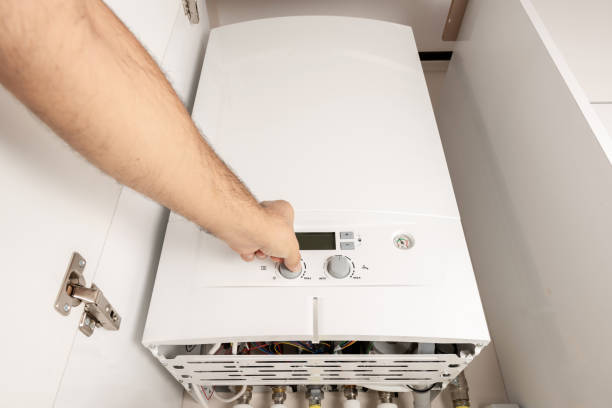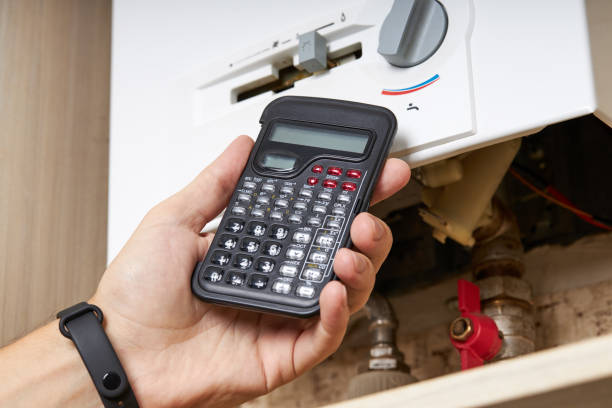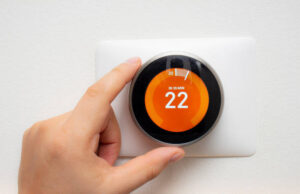Are you wondering how much gas your combi boiler uses? It’s a common question among homeowners who want to keep their energy bills low. Combi boilers are known for their efficiency, but they still use gas to heat your home and water. Understanding how much gas your combi boiler uses can help you make informed decisions about your energy usage.
Several factors influence the gas consumption of a combi boiler, including the size of your home, the number of occupants, and your hot water usage. The average gas consumption of a combi boiler can vary depending on these factors. Measuring your gas usage can help you determine how much you’re spending on energy and identify ways to reduce your consumption. In this article, we’ll explore the factors that influence gas consumption, how to measure gas usage, and ways to reduce your gas consumption.

Key Takeaways
- Understanding the factors that influence gas consumption can help you make informed decisions about your energy usage.
- Measuring your gas usage can help you determine how much you’re spending on energy and identify ways to reduce your consumption.
- Improving your boiler’s efficiency and reducing your hot water usage are effective ways to reduce your gas consumption.
Understanding Combi Boilers
If you’re looking for a boiler that can provide both hot water and central heating, a combi boiler might be the right choice for you. Combi boilers are designed to be compact and efficient, making them a popular choice for many households.
Combi boilers work by heating water directly from the mains supply when you turn on a tap or shower. This means that you don’t need a separate hot water tank, saving space and reducing installation costs.
When it comes to fuel, combi boilers can run on different types of gas, including natural gas, LPG, and oil. The amount of gas a combi boiler uses will depend on a few factors, including the size of the boiler, the heating output, and the efficiency rating.
To get an idea of how much gas your combi boiler uses, you can check the manufacturer’s specifications or consult with a heating engineer. You can also look for the gas consumption figure, which is usually given in kW/h or cubic metres per hour (m3/h).
It’s worth noting that the gas consumption figure is not the same as the boiler’s heating output. The heating output is the amount of heat that the boiler can produce, while the gas consumption figure tells you how much gas the boiler uses to produce that heat.
In general, combi boilers are known for their energy efficiency, with some models boasting efficiency ratings of up to 93%. This means that for every £1 spent on heating your home, only 7p is wasted on energy.
Overall, combi boilers are a convenient and efficient option for many households. If you’re considering a combi boiler, be sure to do your research and choose a model that meets your heating and hot water needs.
Factors Influencing Gas Consumption
When it comes to calculating the gas consumption of your combi boiler, there are several factors that can influence the amount of gas used. Here are some of the key factors to consider:
Boiler Size and Output
The size and output of your combi boiler will have a significant impact on how much gas it uses. Generally speaking, larger boilers with a higher output will use more gas than smaller boilers. This is because they are designed to heat larger homes with more radiators and hot water demand.
Home Size and Insulation
The size of your home and the quality of its insulation will also affect gas consumption. Larger homes with poor insulation will require more energy to heat and maintain a comfortable temperature, resulting in higher gas usage. Conversely, smaller homes with good insulation will require less gas to achieve the same level of warmth.
Hot Water Demand
Combi boilers are designed to provide both heating and hot water on demand. The amount of hot water you use will therefore have a direct impact on how much gas your boiler consumes. If you have a large family or frequently use hot water for baths and showers, you can expect your gas usage to be higher.
Thermostat Settings
The temperature you set your thermostat to can also affect your gas consumption. The higher the temperature, the more energy your boiler will need to use to maintain it. It’s important to find a comfortable temperature that is also energy-efficient. You can also save on gas usage by turning down the thermostat by just a degree or two.
Boiler Efficiency
Finally, the efficiency of your combi boiler will play a role in how much gas it uses. A more efficient boiler will require less gas to produce the same amount of heat as a less efficient boiler. You can check the efficiency rating of your boiler to see how it compares to other models on the market.

Average Gas Consumption of Combi Boilers
Combi boilers are a popular choice for many households in the UK due to their compact size and efficiency. However, it’s important to know how much gas a combi boiler uses to ensure that you’re not overspending on your energy bills.
The exact gas consumption of your combi boiler will depend on various factors, such as the size of your boiler, how often you use it, and its efficiency rating. Typically, combi boilers in the UK range from 24 kW to around 40 kW in size.
According to Viessmann UK, a 24 kW combi boiler will use 24 kW of energy per hour. If you use your boiler for a total of five hours per day, your daily usage should be around 120 kWh. This puts a typical household’s monthly gas usage at around 1,000 kWh.
However, it’s worth noting that your residential gas use typically includes gas boilers, cooking, and other purposes. According to Uswitch, 78% of UK residents use gas central heating in their homes, and 80% of UK households have combi boilers.
To help you estimate your combi boiler’s gas consumption, here’s a table that shows the approximate gas usage based on the size of your boiler and the number of hours you use it per day:
Approximate Gas Usage Based on Boiler Output (KW)
| Boiler Size (kW) | Hours of Use per Day | Gas Consumption per Day (kWh) |
|---|---|---|
| 24 | 1 | 24 |
| 24 | 2 | 48 |
| 24 | 3 | 72 |
| 24 | 4 | 96 |
| 24 | 5 | 120 |
| 30 | 1 | 30 |
| 30 | 2 | 60 |
| 30 | 3 | 90 |
| 30 | 4 | 120 |
| 30 | 5 | 150 |
| 40 | 1 | 40 |
| 40 | 2 | 80 |
| 40 | 3 | 120 |
| 40 | 4 | 160 |
| 40 | 5 | 200 |
Remember, these are just estimates, and your actual gas consumption may vary depending on your usage habits and other factors. However, using this table as a guide can help you get a better idea of how much gas your combi boiler is likely to use.
How to Measure Gas Usage
If you want to know how much gas your combi boiler is using, you can measure it in kilowatt-hours (kWh). This is the standard unit of measurement for gas consumption.
To measure your gas usage, you will need to know the power output of your boiler in kilowatts (kW), as well as the number of hours you use it each day. You can then calculate your daily gas consumption in kWh by multiplying the kW rating of your boiler by the number of hours it is used.
For example, if your combi boiler has a power output of 24 kW and you use it for 4 hours each day, your daily gas consumption will be 96 kWh.
You can also use an online calculator to estimate your gas usage. These calculators take into account your boiler size and usage patterns to provide an estimate of your gas consumption.
It’s important to note that your gas usage will vary depending on a number of factors, including the age and efficiency of your boiler, the temperature you set your thermostat to, and the size of your home. Regular boiler servicing and maintenance can help to ensure that your boiler is running efficiently and using gas as efficiently as possible.
Can I Leave My Boiler On Continuously?
Impact of Boiler Efficiency on Gas Usage
When it comes to gas usage, the efficiency of your combi boiler plays a significant role. An inefficient boiler will consume more gas to produce the same amount of heat, resulting in higher energy bills and increased carbon emissions. On the other hand, a highly efficient boiler will use less gas and save you money in the long run.
According to British Gas, every new boiler in the UK today is at least 90% efficient or A-rated. However, older boilers can be as low as G-rated, which means they are less than 70% efficient. Upgrading from an older D-rated boiler to a modern A-rated one can make a significant difference in your gas usage and energy bills.
The exact gas consumption of your boiler will depend on various factors, such as the amount of time you use it, its size, as well as its efficiency rating and temperature settings. Boiler sizes in the UK are measured in kilowatts (kW) and range from 24 kW to around 40 kW.
Condensing boilers are designed to be efficient systems that recover heat that would otherwise be lost. However, in people’s homes, boilers often don’t manage the efficiency advertised. To ensure your boiler is functioning at its maximum efficiency, it’s essential to have it serviced regularly by a qualified engineer.
In conclusion, the efficiency of your combi boiler has a significant impact on your gas usage and energy bills. Upgrading to a modern, highly efficient boiler and having it serviced regularly can help you save money on energy costs and reduce your carbon footprint.
How to Calculate Heat Loss in a House: A Comprehensive Guide
Reducing Gas Consumption
If you want to reduce your gas consumption and save money on your energy bills, there are a few things you can do.

Use a Programmable Thermostat
One of the easiest ways to reduce your gas consumption is to use a programmable thermostat. With a programmable thermostat, you can set your heating system to turn off or turn down when you’re not at home or when you’re asleep. This can save you a lot of money on your energy bills over time.
Insulate Your Home
Another way to reduce your gas consumption is to insulate your home. If your home is poorly insulated, you’re losing a lot of heat through your walls, roof, and windows. This means that your heating system has to work harder to keep your home warm, which uses more gas. By insulating your home, you can keep more of the heat inside and reduce your gas consumption.
Maintain Your Boiler
Regular maintenance of your boiler can also help to reduce your gas consumption. A well-maintained boiler is more efficient and uses less gas than a poorly maintained one. Make sure you have your boiler serviced once a year by a qualified engineer, and keep an eye on the pressure gauge to ensure that your boiler is running at the correct pressure.
Upgrade Your Boiler
If your boiler is old and inefficient, it may be time to upgrade to a new, more efficient model. Modern condensing boilers are much more efficient than older models, and can help to reduce your gas consumption and save you money on your energy bills.
Use Energy-Saving Features
Finally, many modern boilers come with energy-saving features such as timers and thermostats. By using these features, you can reduce your gas consumption and save money on your energy bills. Make sure you read the user manual for your boiler to find out how to use these features.
Environment and Sustainability
When it comes to choosing a combi boiler, it’s important to consider the impact it will have on the environment. With the growing concern over climate change, reducing carbon emissions and increasing energy efficiency has become a priority for many homeowners.
Combi boilers can run on a variety of fuels, including natural gas, oil, LPG, and electricity. However, it’s worth noting that gas boilers emit carbon dioxide (CO2) when they burn fuel, which can contribute to global warming. In fact, according to recent analysis, the millions of gas boilers in the UK’s homes produce twice as much CO2 as all the nation’s gas-fired power stations combined.
Fortunately, many manufacturers are now focusing on developing more eco-friendly combi boilers. These boilers are designed to be more energy-efficient, which can help reduce carbon emissions and your energy bills.
One way to identify an eco-friendly combi boiler is to look for models that are compatible with hydrogen fuel. Hydrogen is a clean-burning fuel that produces only water when it’s burned, making it a much more sustainable option than gas. While hydrogen boilers are not yet widely available, many manufacturers are already building combi boilers that are compatible with hydrogen, so it’s worth considering this as an option for the future.
Another way to improve the sustainability of your combi boiler is to choose a model with a high energy efficiency rating. Look for boilers with an ErP (Energy-related Products) rating of A or above, as these are the most efficient models on the market. You can also consider installing a smart thermostat, which can help you control your heating more efficiently and reduce your energy usage.
Overall, choosing an eco-friendly combi boiler is an important step towards reducing your carbon footprint and helping to protect the environment. By considering factors such as fuel type, energy efficiency, and compatibility with hydrogen, you can make an informed decision that’s both sustainable and cost-effective.
Conclusion
Understanding how much gas a combi boiler uses is crucial for managing your household expenses. Based on the information provided in this article and the search results, we can see that the amount of gas a combi boiler uses can vary depending on factors such as the size and age of the boiler, the current cost of gas, and your household’s usage.
It is important to note that combi boilers are the most energy-efficient and cheapest type of boiler to run, making them a popular choice for households in the UK. However, it is still important to monitor your boiler’s gas usage to ensure that you are not overspending on your energy bills.
If you are concerned about your boiler’s gas usage, there are several steps you can take to reduce it. These include:
- Regularly servicing your boiler to ensure it is running efficiently
- Installing a programmable thermostat to control your heating and hot water usage
- Insulating your home to reduce heat loss
- Upgrading to a newer, more energy-efficient boiler
By taking these steps and monitoring your boiler’s gas usage, you can ensure that you are not overspending on your energy bills and are doing your part to reduce your household’s carbon footprint.

